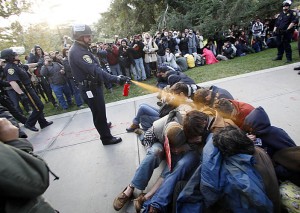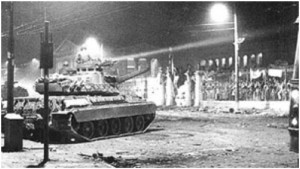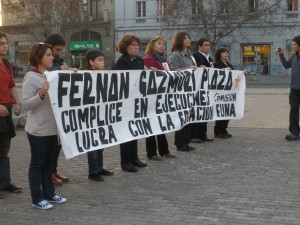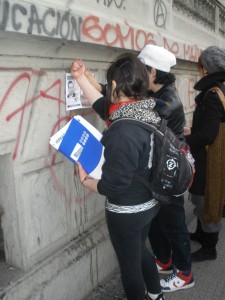Two 11/17s

UC Davis Quad, 11/17-11/18/2011
Late yesterday afternoon, UC Davis police, most dressed in riot gear and helmets, bearing truncheons and tear-gas grenade guns descended upon a group of UC Davis undergraduate and graduate students who had set-up an Occupy encampment in the large grassy “quad” at the center of our campus.
I had visited the campers earlier in the day and brought them donuts. Donuts? Yes, I know how much my own kids like donuts when we’re camping, plus this being Davis, I figured that most of the other donated food would be “healthy.”
The tents had been set up on both sides of Centennial Walk. Again, this being Davis they had rolled in multiple trash, recycling and compost cans. It had rained, but their spirits were good. The demonstration was peaceful; and the main political statement was the simple and sublime message that this is their campus, their university and their future – and that there is something dreadfully wrong with the way things are.
Later that afternoon the police came and forced the students to remove their tents. The students mounted some resistance but in the end complied. About a dozen more decided to remain at the site in protest, sitting and locking arms. For reasons that are still unclear, a member of the UC Davis police then began to spray the students with pepper-spray. His demeanor was almost nonchalant, with no visible signs of recognition that he was inflicting pain on a group of young people posing no apparent threat to him, the other police officers or “public safety.”
Take a look at the videos.
In the end the police left to sounds of the hundreds of students who had gathered nearby shouting “shame.” When you can catch a glimpse of the eyes of the police behind their riot gear, there is a kind of embarrassed and slightly humiliated look. In that moment, one sees how the abuse of human rights, how brutality – even in this limited and casual way — diminishes the humanity of not just those beaten or “peppered,” but also of those committing the act under orders.
The images from Davis will become iconic in the Occupy Movement.
11/17/1973 The Polytechneion, Athens
For the student protester who had gathered on the campus of the Greek equivalent of MIT, the stakes were very high. Since 1967 Greece had been ruled by a brutal military junta, the so-called Regime of Colonels, which had suspended most civil rights and engaged in torture.
Part of the junta’s style of rule was banning student government and protests and rounding up student activists. One of the junta’s favorite techniques was forcibly drafting students into the military, where they could be subjected to further human rights’ abuse or just “disappear” altogether.
In February of 1973 students at the Athens law school set up barricades and “occupied” their campus in protest of the drafting of 88 of their colleagues. The junta’s puppet prime minister ordered the police to retake the campus, which they did and with a great deal of brutality.
The brutal nature of the police response further radicalized Athens’ students. On November 14, 1973 the students of the Polytechneion declared a strike and more importantly, set up a radio station – think pre-Facebook old school media. The radio station began broadcasting speeches, songs, and poems. Spurred by the broadcasts, Athenians came to the campus in support.
Fearing a general uprising the puppet government ordered the military to retake the campus. At 3:00 am on 11/17/1973 a tank crashed through the campus’ front gate and shortly thereafter the radio went silent. 24 civilians would be killed in the violence that ensued.

Tanks at the Polytechneion
But the uprising and its suppression played a critical role in helping bring an end to military rule in Greece and initiating Greece’s reengagement with democracy, a tumultuous and very difficult historical process called the Metapolitefisi. Greece is having all sorts of problems at the moment, but democracy isn’t one of them and Greece and Greeks are fully integrated into European political structures that protect and extend human rights.
Our chancellor went to the Polytechneion, and I’m sure she remembers the bravery of the Greek students in the face of tanks and guns from her childhood. It is precisely because of this history and memory that I think she understands better than most in our administration the power of student anger and resilience; she also knows how critical it is to find a way forward that engages students and faculty in a serious and authentic way.




